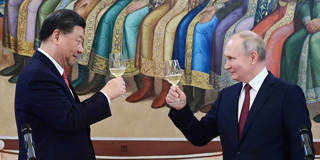The Indo-Pacific narrative has its merits, and will undoubtedly remain important for shaping policies to meet the challenges of the twenty-first century. The problem is that it threatens to distract Western leaders from an alternative framework – the Eurasian alliance of Russia and China – whose immediate relevance is undeniable.
STOCKHOLM – Is the dominance of “Indo-Pacific” thinking leading Western strategists astray?
Originating in Australian foreign-policy circles, the United States adopted this label in 2018, when the Hawaii-based US Pacific Command was officially renamed the Indo-Pacific Command. The status of the Quadrilateral Security Dialogue (“Quad”), comprising Australia, India, Japan, and the US, was duly elevated, and Europe, too, got on board, with a minor avalanche of policy documents bearing the same label.
In pushing the Indo-Pacific line, Western strategists usually emphasize the importance of bringing India into the fold. But the real objective – though it is seldom stated explicitly – is to contain China in the region.

STOCKHOLM – Is the dominance of “Indo-Pacific” thinking leading Western strategists astray?
Originating in Australian foreign-policy circles, the United States adopted this label in 2018, when the Hawaii-based US Pacific Command was officially renamed the Indo-Pacific Command. The status of the Quadrilateral Security Dialogue (“Quad”), comprising Australia, India, Japan, and the US, was duly elevated, and Europe, too, got on board, with a minor avalanche of policy documents bearing the same label.
In pushing the Indo-Pacific line, Western strategists usually emphasize the importance of bringing India into the fold. But the real objective – though it is seldom stated explicitly – is to contain China in the region.